|
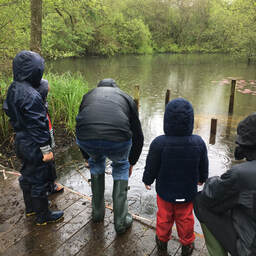 Last Sunday, 17th May, we had our very first Muddy Church down at the Nature Discover Centre in Thatcham. What is Muddy Church, I hear you cry? Well for us, Muddy Church was a chance to get very muddy indeed as it rained solidly the whole time we were there! But alongside the Mud Muddy Church has a few key ingredients that, for us, makes it what it is. The first of these is time in nature. Our Muddy Church has a spectacular piece of land down at the lakes with it’s own a reed bed, a wooded area and a lake - plus plenty of brilliant places to hide during a game of hide and seek! As I’m sure you already know there is a raft of evidence that time in nature is beneficial to our mental and physical health. It’s also so important for children when so much more of life happens indoors. Our Muddy Church is primarily a free space for children and families to explore nature and to experience a sense of both peace and adventure. We provide a range of activities, based around a Bible story, for children to get involved with but what they do and how they spend their time is up to them. If they become absorbed in bug hunting and want to spend all their time on that then that is absolutely fine with us! Muddy Church is also, of course, about connecting with God. We come into Muddy Church with the expectation that God is to be found everywhere around us if we take the time to listen and look. At Muddy Church we believe that God can be found in the stillness of nature, the intricacies of a beetle and the joy of a game with new friends. Children’s spiritual lives are marked by this ability to experience wonder and awe at the seemingly ordinary things of life. Activities like Muddy Church allow them to immerse themselves in the world and draw spiritual riches from it. And lastly Muddy Church is about community. It’s a place to be able to rest for a while as the children play or to be a bit of a child yourself as you scramble about in nature. It’s time for children to connect with other children and parents with other parents. We begin each session with a story, sat together in a circle to wonder together (well, we will do when it’s not raining quite so hard!) Muddy Church is a shared experience, a place where we can be a community – and don’t we all need that after the year we have had!
So why not try us out? Muddy Church is for children of all ages and their families. Our next event is on Sunday 27th June from 2.00 to 3.30pm. It’s free to attend but you do need to book in (and we are booking up fast!) To reserve your place email [email protected]. 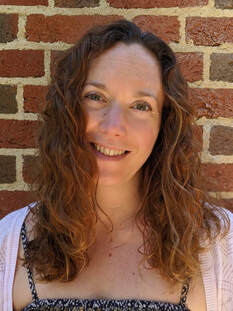 ‘What a wacky job!’ (accompanied by eyes out on stalks) is thus far my favourite reaction to the news that I am training to be a vicar. This particular conversation was a while back now and I still don’t know whether to be amused or concerned that this came as such a shock! But ‘wacky’ or otherwise, it’s really as much a surprise to me as to others, that I find myself the proud new owner of a ’magic’ collar. And, as the folks at St Barnabas heard last week when I regaled them with excerpts from my old school reports, it's not what I would have anticipated when I was sitting in the careers office at school. ’Angela is painfully shy’ was the recurring theme of my school reports, along with observations about a lack of confidence associated with anything to do with public speaking. So how then does a person who would naturally choose to sit behind a pillar at church, end up in one of these conspicuous collars and standing up the front? Perhaps I should know better than to be surprised. After all, some of the the biggest hitters in the Bible are amongst the most unlikely candidates you could ever meet. Moses is crippled with angst, Jonah is riddled with self-doubt, Matthew makes his living from fiddling other people out of their taxes, and Peter, the ‘rock’ on whom the church is built, is indecisive to the point of fickle. And, yet, unlikely and ill-qualified as they may seem, God calls them to do a job and, surprise surprise, that’s what they end up doing — after a while, as readers, we can’t imagine them doing anything else. At various points along my own journey, I’ve been asked to describe my vocation, and even after an expensive theological education, I’m largely stumped to come up with the words. I explained the process to St B’s in terms of a potter and the clay (and even that explanation is half-inched from the prophet Isaiah!) But as people on life’s journey, none of us is a hard-fired pot. We’re not the finished article; we’re pliable, mouldable and, like the potter and his clay, we warm up in the hands of God. Its been a long journey for me, the moulding and warming up began when I was about 20, but I didn’t do anything about it until about five years ago. I’d had both my children, then my Mum died not long after our second was born, and I found myself at a kind of crossroads, wondering what to do, whether to go back to project management or to do ‘something else’. So I decided I would just let myself entertain the idea of being a vicar, sit with it for a bit, and see how I felt. There could be no harm in that, surely? A few coincidences later, I found myself sitting across a desk from the person in charge of rustling up new clergy in the Oxford diocese. I didn’t get the job he was interviewing me for, but I did get a phone call saying the panel were unanimously of the opinion that I should explore a vocation to ministry. And the rest, as they say, is history. This might resonate with you because the business of vocation and inner calling, isn’t just one for clergy and those in ‘vocational’ careers. We’ve become used to careers in medicine and education, therapy and social work, being described in terms of vocations — and how much more did we become aware of the extent to which this is is true, during lockdown, with medical staff moving out of home to continue their work? — but, there is a vocation, a calling, in each of us, sometimes buried deeply, but there nevertheless. And it's a calling to use the gifts and skills and talents that are uniquely ours, not only for our own benefit, but for the benefit of those around us. I suppose in this sense, my job is ‘wacky’! But it’s one of many wacky jobs out there and the question: ‘What is your calling?’ is one for all of us. Exploring vocation isn’t without its risks, but speaking from experience I’d say its usually one which is worth taking! Rev Angela 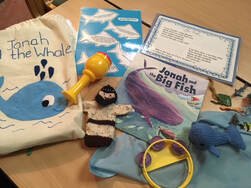 Many of you, like me, will be missing very much the usual provision for children that we parents normally enjoy. Hopefully it won’t be too long until children’s church, and the other activities we all love can open up again. In the meantime, how about an afternoon of stories and craft with the kids in your home? Here is a complete session on Jonah and the Whale for you to enjoy together! The Story Pictured is the book Jonah and the Big Fish by Katherine Sully. I love the illustrations and it is told in a nice simple way. Alternatively you can use any version of the story you have from a children's bible or even perhaps watch this brilliant video by Saddleback kids. You might consider pulling out a few props as you tell the story. A piece of blue fabric could be the sea, you could introduce some plastic fish or other seas creatures and some instruments to play when the stormy weather comes. Ideas for Music When I tell this story I like to relive my school days and play Jonah-Man Jazz by Michael Hurd as our background music while we craft! During the story time you could try singing this song to the tune of Frere Jacque, check out our Instagram stories to hear this! ‘I hear Thunder, I hear Thunder, How about you? How about you? Pitter-patter rain drops, pitter-patter raindrops. I’m wet through, so are you!’ When Jonah was tossed overboard and the storm stilled I played and sang ‘I see blue skies, I see blue skies, Way up high, way up high. Hurry up the sunshine, hurry up the sunshine. I’ll soon dry, I’ll soon dry!’ Crafts There is so much you could do to explore the story of Jonah. The underwater theme is a gem in itself. I decided on these… Pom Pom Whale 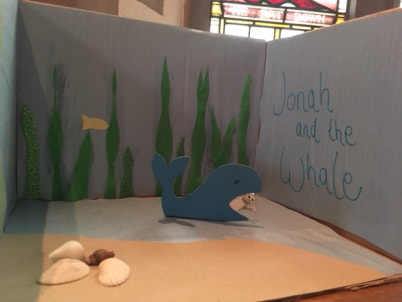 I made this little fellow using a small pom pom maker. I then cut our his fins and tail from blue felt and attached them and the googly eyes with fabric glue. This has gone down a storm with all the kids I’ve shared this with, though we all remarked that he seems far too cute to swallow up a person! Whale Cookies Remaining on the whale theme try whisked up some whale or simple sea themed biscuits and ice them together! Jonah Dioramas My little prototype is nothing on what some of the kids came up when they try this craft! This is such a lovely craft that really helps children to explore the story for themselves and think about the most important parts for them. To make it I cut a box in half, ‘wallpapered’ it with some blue paper and then used sandpaper for the seashore. Other than that, let your imagination run wild with shells, scraps of paper and glitter card! Love Pictures It’s lovely and important I think for children to explore the story from their own perspective rather than bumping quickly into the thing we want them to learn. I also like to share one thing that really struck me from the story as we discuss it together. For me one of the main themes of the story of Jonah is God’s love for everyone. Jonah is asked to reach out to people different from him and to understand that God loves them as much as he does Jonah. That’s a pretty good lesson for all of us! For this craft I encouraged your children to create whatever they wanted in paints and paper to express the story. This was my contribution! Food How about finishing off with a special Jonah themed dinner? We had a pitta stuffed with fish fingers to represent Jonah in the mouth of the whale with shredded lettuce for seaweed. For pudding we had crumbled biscuits (sand) topped with blue/green jelly (the sea). You could also dip your whale cookies in the sea! A perfect tea! So there’s a whole raft of ideas for an action packed Jonah themed afternoon! Enjoy! 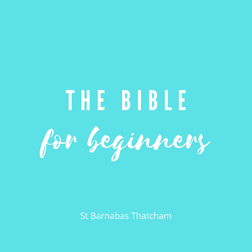 The Bible is an extraordinary book but let's be honest, it can be a challenge to get going with it! Much of what makes the Bible so fascinating - the huge span of history it was written over, the different authors and the different genres within it - can also make it somewhat tricky to navigate. Whether you are brand new to thinking about faith, spirituality and the church or if you have been in church for many years, we can all use some help and support when it comes to getting to grips with the Bible. In our recent Podcast episode we thought all about this topic including 'Why bother with the Bible?' and 'how can we begin reading it or get back into reading it again?' In the episode I mentioned some resources that I wanted to link up for you here. The first of these was a month long Bible reading plan to get you started which you can download here. There is so much more to explore than what I could include here but I hope that this plan will give you an overview of the story of the Bible and the different kinds of writing within it. And perhaps inspire you to keep reading! I also mentioned a novelization of the Bible that I found extremely helpful when I first started reading the Bible. This was The Book of God by Walter Wangerin. I also mentioned a series of helpful books to accompany any book of the Bible you are reading, the 'For Everyone' series by Tom Wright. Happy Bible Reading and do get in touch if you have an questions, comments or thoughts to share! Rev Nicola This Lent we are trying out a Lent course with a difference! Rather than meeting together in person each week I will be running a course where we can meet together without even leaving our own sofas! This Lent group, following the book Dust and Glory by David Runcorn, will take place online and there we will share thoughts and discuss all that we are reading as we journey through Lent together.
Why online? Well perhaps getting out of an evening after work isn’t a straightforward task for you. Perhaps you have children and finding a weekly babysitter isn’t practical. Or perhaps you struggle to get out and about physically. Or perhaps you simply want to dip your toe in the water and join along with a group of people thinking about the themes of Lent without the pressure of turning up in person to a new and unfamiliar place? Even though you don’t have to leave home to be part of it, this course will take us all on a journey. Did you know that the word ‘Lent’ derives from and ancient word meaning ‘spring’ or ‘long’ referring to the time of year when we are turning from winter cold and dark to the warmth and new life of spring? Through the course this is the journey that we will be taking too. The short daily reflections from Ash Wednesday to Easter Day range across the whole business of living and believing, where the questions are as important as the answers. We start this group on Ash Wednesday, the 26th February, but you are welcome to join us if you are reading this after that date and to join in our discussions in our Facebook Group. This group is open to absolutely everyone whether you regularly come to church or you’ve never been at all! If you would like to join all you need to do is buy a copy of Dust and Glory by David Runcorn and search for our group ‘Dust and Glory Lent Group’ on Facebook. I hope to see you there! Nicola 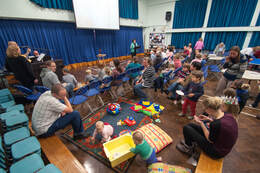 Taking children to church can be a challenge. In fact, let’s face it, taking children anywhere outside your living room can be a challenge some days! But as you’ll also know, the rewards, when you do manage to get the kids somewhere new and special are immense. You get to see them grow as they interact with new people and face new challenges. You get to share new experiences with them and make memories as a family. You get to share the things you love and that are important to you with your children, shaping them for who they will become in the future. You get all this and more when you bring your children to Church. At St Barnabas we love having children in our service and they are at the centre of our community. Of course we meet in a school – so that helps! – but we also really value the spiritual lives of the children and recognise that they need nurturing as much as us adults do. Our children’s thoughts, feelings and insights are really important to us and we want to see them flourish from their time spent at Church. We also aim to make life a bit easier for you because, well, parenting is hard work!! At our services you will always find a play area where babies and toddler can be let loose meaning that you can enjoy and participate in the service. There is also an area with craft activities, colouring, puzzles and games to keep slightly older children entertained. We try to create services that are engaging for all ages using drama, storytelling and prayer activities to get them involved with the action. Our services aren’t silent, there is plenty of laughter and outbursts from excited toddlers don’t faze us! We also run children’s groups every other week when the children go out of the main service to have their own session. Here they might be doing any number of things from exploring a story from the Bible using Playmobil, doing an obstacle course, having discussions about their life and what is important to them or crafting up a storm! All our children’s leaders are safely recruited and you are welcome to stay with your child in their session or leave them to it and go and enjoy the service. Children of all ages are welcome in our groups. Every community is a work in progress and St B’s is no different. We are always seeking to develop what we offer for the children amongst us, and this is a big priority for us in 2020, but you can always be sure that your children will receive a warm welcome at St B’s and will be very much part of the community. Why not bring them along and see if St B’s is a good fit for you? Rev Nicola 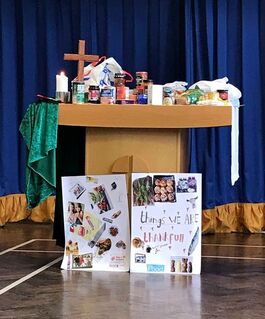 The Harvest Gifts for the Food Bank collected at St B's The Harvest Gifts for the Food Bank collected at St B's Is it just me or are sometimes the most simple things the most challenging to get right? One of the things that I love most about spending time in school, or with children in general, is that in teaching them we also teach ourselves. As we try to draw simple and practical lessons from our faith that the children can understand and act upon I am always, inevitably, challenged myself to think again about how I am doing in these areas. This term at Thatcham Park we have been thinking about one of the schools core values of Thankfulness. This topic comes at an interesting time. In the season we are celebrating harvest and at St Barnabas we have been thinking about this from the perspective of Climate Change which, quite rightly, dominates our news at the moment. In this climate change movement we have seen children leading the way, challenging those in power to make good decisions for their generation and generations to come. Our harvest celebration at St B's featured both a celebration and thanksgiving for all that God has given us and also seeking God’s forgiveness and making commitments to change at this critical time for the future of our world. For us too this was led by our children (and 7th Thatcham Brownies who visited us that day) who created a collage of ways we can and should act to play our part in the fight against climate change. As I have spent time with the children in school it has struck me that perhaps the simple act of thankfulness underpins so much of this. We have had somewhat of a tour of the Bible in assembly (the children are developing a great grasp of what’s in the Bible and where!) beginning in Genesis. We thought about the gifts that we take for granted. The things that sustain all life; water, green plants, light, the ecosystems of the earth. In the second week we headed into the gospel to think about the practice of saying thank you, looking at the story of the ten lepers. I was struck, have I gone to God recently to say thank you for the indescribable gifts that I have been given? My health, my home, my child, my work? Or am I like one of the nine who simply walks away? Next we journeyed into the Psalms and sang a psalm of thanksgiving, temple style, with crashing cymbals, bells and drums. We reflected on the different ways to say thank you to God, particularly through what we create in art and music. We listened to some modern musicians giving thanks to God and wondered how we could do the same. We’ll continue our series by thinking about how we can be thankful in all circumstances, the good and the bad, and how we can share all the good things that we have been given. Throughout this time I’ve been struck by how this simple practice, saying thank you and practicing gratitude can be so profound. With an attitude of gratitude many other things take care of themselves. We naturally give with joy. We protect the great gifts we have been given (even the ones that are with us every day) because we recognise them for what they are – gifts. When we are thankful we have a better perspective and, also perhaps, a better walk with God. So I’ll end with the same question I have been asking the children this term, what are you thankful for today? And how can you show it? Revd Nicola |
Archives
May 2021
Categories |
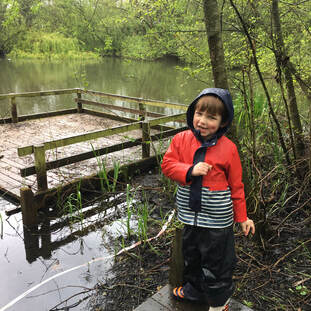
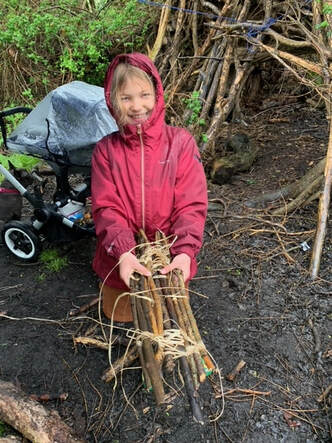
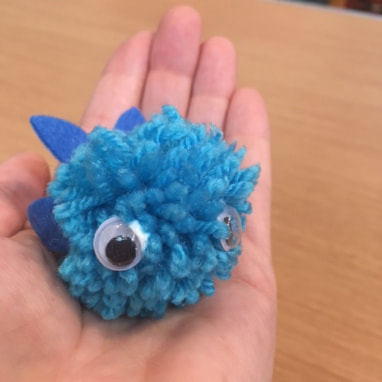
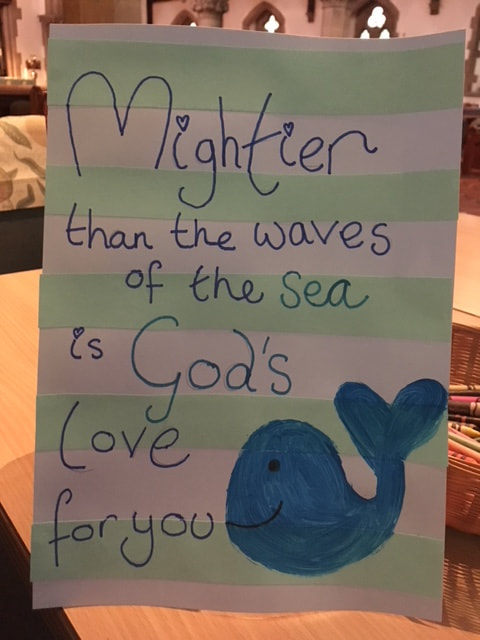
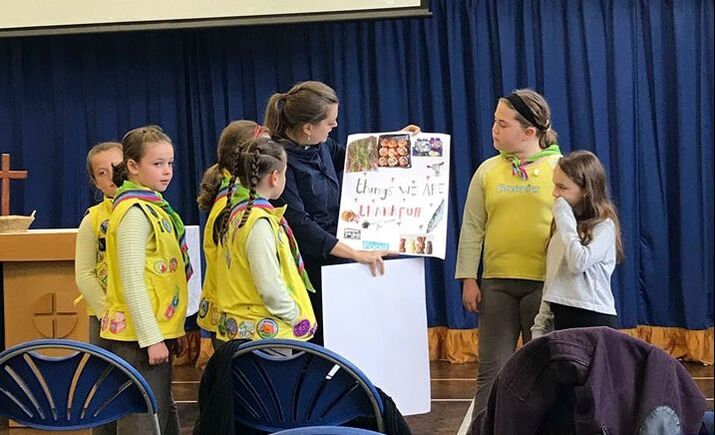
 RSS Feed
RSS Feed
